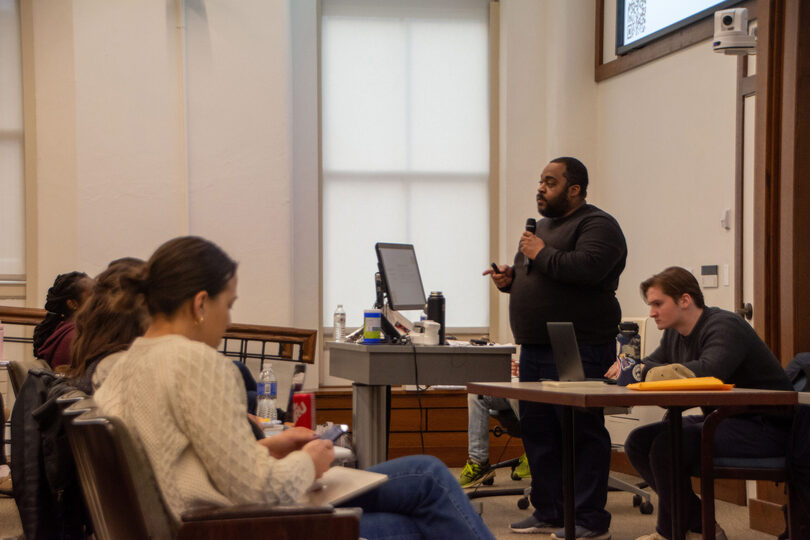‘Still here’: Now-deregistered GSO starts new term as independent entity

Without university resources, SU's Graduate Student Organization has struggled to engage with the administration and student body, Ethan Jackson, the group’s director of external affairs said. Christian Calabrese | Asst. Photo Editor
Get the latest Syracuse news delivered right to your inbox.
Subscribe to our newsletter here.
After Syracuse University deregistered its Graduate Student Organization over the summer, Ethan Jackson, the group’s director of external affairs, said graduate students should know they’re “still here.”
“We would like to continue serving the graduate students. We want to be a watchdog,” Jackson said. “We do plan on trying to rally with senators and other students on campus to hopefully get some kind of response from the administration, to engage in some productive conversation, but it is a weird time.”
Without university resources, Jackson said GSO has struggled to engage with the administration and student body.
The organization will continue to look for ways to move forward through allies within the university, including university senators who have offered support, Jackson said.
On June 2, GSO executive officers began their terms for the 2025-26 academic year. The same day, Graduate School Dean Peter Vanable informed the officers and graduate student body that the university would no longer recognize GSO as a registered student organization.
In April, GSO declared itself an independent “autonomous entity,” due to “increased administrative oversight”— a move SU warned would result in the organization losing institutional support, a university spokesperson said in a June statement to The Daily Orange.
After Vanable told GSO they were no longer recognized by the university, GSO officers asked to work with the university as “equal collaborators.”
Jackson said GSO never intended to “break away” from the university.
In a statement to The D.O., GSO President Roger Rosena agreed that it’s been difficult to communicate with students, though GSO intends to reach out to the graduate student body in the next few weeks. While GSO wants to hold open forums, he said it will be challenging without access to university buildings.
“It appears that there is no transparency and there are no democratic procedures to determine our well-being on campus,” Rosena wrote. “Any decision or request made by graduate students will ultimately come from the voice of the administration rather than the students themselves.”
Despite additional attempts at open communication with the university since June, Jackson said no progress has been made. Most emails sent by GSO to the university have gone unanswered or been shut down, he claimed.
“There just is no desire from the administration to come to the table,” Jackson said.
In Vanable’s June email to GSO officers, he wrote the “explicit rejection” of SU oversight and advising places GSO outside the RSO framework, excluding it from university resources, including funding, email and computer network access and office space.
“The terms outlined in the GSO’s resolutions and demanded repeatedly by GSO leaders cannot be accommodated through continued negotiations or a new GSO charter,” the SU spokesperson said in a June statement to the D.O.
GSO Comptroller Allison Hellman said the university is still providing resources and holding events for graduate students, but students no longer have a voice in those decisions. She said she’s “disappointed” by the power imbalance, particularly from a school that has such vibrant research, activities and scholarships.
“I think it’s a difficult time for everyone,” Hellman said. “There’s a pretty large power imbalance in that we need our emails. There are stakes for us. It’s not a great time for, especially international students, to speak out publicly on these sorts of issues.”
Jackson said he was studying abroad in Italy when he first heard about the turmoil with university administration. He said it was frustrating to have to pull away from that experience.
“This is not how I wanted to spend my time as a graduate student,” Jackson said. “I’m a special education teacher. I want to study and focus on disability and how we create access for people. I didn’t want to fight the administration.”
Jackson said GSO’s April resolution, titled “Declaration of Independence,” was meant to spark discussion about defining power, not to sever ties with the university. He acknowledged the title could have been clearer.
“We want to build a better university together,” Jackson said. “We don’t want unlimited power. That’s not what this is about. It is about clearly defining what the GSO does and the limits of the GSO.”
Following Chancellor Kent Syverud’s decision to step down, Jackson added that he was concerned after Syverud’s proposal for Interim Vice Chancellor and Provost Lois Agnew — who had previously rejected GSO’s attempts at open communication — to remain in her position.
Students haven’t been directly told how they can give input on a new chancellor, Rosena said, but he hopes GSO can be included in the selection process.
“I don’t know if we will make any kind of real change. I don’t really know what the future holds, but it feels wrong to do nothing,” Jackson said.






